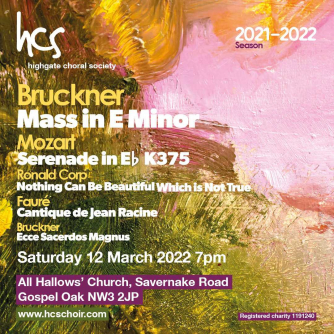Details
All Hallows Church
Savernake Road
Gospel Oak
London
NW3 2JP
England
Programme
Ronald Corp – Nothing Can Be Beautiful Which is Not True
Gabriel Fauré – Cantique de Jean Racine, Op.11
Wolfgang Amadeus Mozart – Serenade in E-flat major, K.375
Anton Bruckner – Ecce sacerdos magnus, WAB 13
Anton Bruckner – Mass no.2 in E minor, WAB 27
Performers
Ronald Corp – Conductor
Highgate Choral Society
New London Orchestra
Programme Note
Highgate Choral Society's March concert should have been performed in March 2020 but due to Covid19 was postponed now.
The concert brings together jewels of nineteenth century Austrian and French sacred choral music with a new choral work by Ronald Corp.
Anton Bruckner’s great Mass in E minor is a setting of the mass ordinary scored for eight-part mixed choir and wind instruments. It was composed in 1866 to celebrate the completion of the Votive Chapel in the new cathedral of Linz, and first performed outside the cathedral in 1869. Bruckner extensively reworked the mass in 1882.
Ronald Corp’s Nothing Can Be Beautiful Which Is Not True is a setting of quotations on Art taken from works by the Victorian author, poet and artist John Ruskin. It was written in memory of Alfred Mignano, an enthusiastic art collector and wonderful supporter of the choir.
Gabriel Fauré’s Cantique de Jean Racine is a popular choral favourite, composed in 1864/65 when Fauré was only nineteen years old. It won first prize in a composition competition at the Ecole Niedermeyer school of music in Paris where Fauré was a student, and was first performed in 1866 with string and organ accompaniment. The text by the seventeenth century dramatist Racine paraphrases in French the medieval Latin hymn Consors paterni luminis.
Bruckner’s short sacred motet Ecce Sacerdos Magnus (Behold a Great Priest) was composed in 1885 for the 1,000th anniversary of the Diocese of Linz. Scored for eight-part mixed choir, trombones and organ, this ceremonial piece was intended as processional music for the bishop’s entrance into the cathedral.

 Your events at Classical Events
Your events at Classical Events

